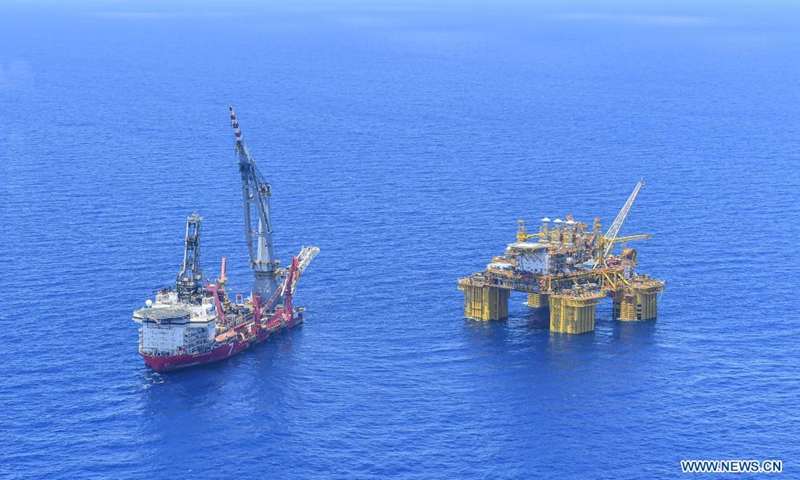
Photo taken on May 12, 2021 shows the Deep Sea No.1 deep-water gas field, 150 kilometers off the city of Sanya in south China's Hainan Province. Deep Sea No.1, China's first self-operated 1,500-meter deep-water gas field, started production on Friday, according to the China National Offshore Oil Corporation (CNOOC).Photo:Xinhua
China will speed up the construction of 1,400 major projects confirmed under the central enterprises' 14th Five-Year Plan (2021-25), according to a spokesperson of the State-owned Assets Supervision and Administration Commission of the State Council, as China continues to strengthen investment stabilization measures to fuel economic growth this year.
These projects include the second phase of Deep Sea No.1, China's independently developed, ultra deep-water gas field of China National Offshore Oil Corp, and a nuclear power project in Fangchenggang, South China's Guangxi Zhuang Autonomous Region.
More than 10 central enterprises will be allowed to take the lead in becoming world-class enterprises in their industries, while forming more than 100 typical demonstration enterprises in different fields, Peng Huagang said at a press conference.
This decision shows that China will continue to count on investment as a driving force for economic growth this year, experts said.
In 2022, fixed-asset investment increased by 5.1 percent year-on-year to 57 trillion yuan ($8.4 trillion). Infrastructure investment rose by 9.4 percent, statistics showed.
"When China's economy is being influenced by multiple unexpected factors and facing downward pressure, China is strengthening investment in major infrastructure projects to activate private capital, expand effective investment, drive employment and boost consumption," Zhou Maohua, an economist at Everbright Bank, told the Global Times on Tuesday.
He said that major infrastructure projects play a comprehensive role in achieving those goals, because the industrial chains of those projects are often much longer than for small ones.
Peng noted that China will increase the strength of investment in cloud computing, broadband infrastructure network, 5G and 6G, and other high-tech areas.
In the first 11 months of 2022, central enterprises had completed fixed-asset investment of 3.6 trillion yuan, up 5.6 percent on a yearly basis. More than 20 percent of the capital was channeled into strategic and emerging industries.
As shown in their work reports, most local governments in China continue to rely on investment to drive economic growth this year, with many looking for a double-digit growth in fixed-asset investment.
Six provinces and municipalities, including Chongqing and Hainan, raised their investment targets this year compared with last year, and at least five provinces plan to complete trillion-yuan level investment before the end of 2023.
According to Zhou, because of a high base, China's infrastructure investment growth might slow this year, but real estate and private investment will "obviously improve" as the effect of policies to stabilize the property market emerge.
"In general, China's fixed-asset investment will maintain moderate growth this year and continue to play a pivotal role in boosting the economy," Zhou said.
Global Times

